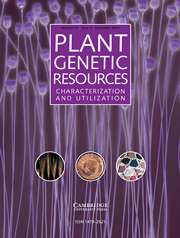Article contents
Using novel variation in Brassica species to reduce agricultural inputs and improve agronomy of oilseed rape—a case study in pod shatter resistance
Published online by Cambridge University Press: 13 March 2007
Abstract
Oilseed rape is a very undeveloped crop with regard to efficiency of production and the agronomic practice used to maximize its potential. The genetic potential to modify oilseed rape is limited by the narrow genetic base found within the breeding gene pool, resulting in limited novel variation available for exploitation. Novel variation is, however, present in wild diploid ancestors of oilseed rape and has been made available by developing synthetic Brassica napus. This is illustrated through the use of this material to develop an understanding of pod shattering which is one of the most agronomically important characteristics of the crop. Through a variety of approaches it is shown how progress has been made to understand this trait and how this understanding is being used to improve the crop such that efficiency of production will be enhanced.
Information
- Type
- Research Article
- Information
- Copyright
- Copyright © NIAB 2003
References
- 3
- Cited by

